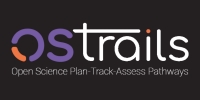Documents such as Data Management Plans (DMPs) play a crucial role in research, supporting researchers in adhering to best practices in research processes. While DMPs are of paramount importance, their assessment in a broader context poses a challenge, prompting a focus on their FAIRification (Findable, Accessible, Interoperable, and Reusable) and integration into scientific knowledge graphs. Expanding research evaluation beyond scientific publications presents many obstacles, including interoperability and semantic and syntactic heterogeneity in scientific knowledge graphs, as well as challenges in interpreting and implementing FAIR principles when extending them to other digital objects.
The OSTrails project proactively addresses these barriers through a collaborative approach and provides practical solutions at three levels:
- At the planning level, the OSTrails project aims to increase the efficiency of Data Management Plans by transforming them into "living," interconnected, machine-actionable resources, making them instruments for improving the quality of research data management.
- For tracking purposes, OSTrails focuses on establishing an open, interoperable, and high-quality ecosystem of scientific knowledge graphs, which could serve as evidence of the implementation of FAIR principles in open science communities.
- In the evaluation processes, the project aims to shift the focus from FAIR assessment to FAIR support by developing modular and scalable tests for assessing the implementation of FAIR principles integrated into various research data management tools.
The methods, tools, services, guidelines, and training resulting from the project will be presented as integral parts of solutions for researchers and research support in achieving FAIR principles at any stage of the research lifecycle for any digital object, intended for institutions funding and/or conducting research and publishers to enhance data management quality for every jointly funded and published research output.
OSTrails aims to reduce barriers in planning and implementing FAIR research, encouraging a transition from FAIR principle evaluation to supportive practices and improving research tracking and evaluation through more connected scientific work. The project is based on alignment with Research Data Alliance (RDA) interoperability frameworks, setting ambitious goals for improving the implementation of FAIR principles in the context of various digital objects, such as publications, data, software, workflows, methods, protocols, machine-actionable data management plans, and educational materials. The focus is also on developing discipline-specific metrics within a flexible model and defining minimum standards for aligning a specific type of processed digital object with FAIR principles. All activities within the OSTrails project represent significant steps towards achieving FAIR principles in European scientific research, enabling better planning, tracking, and evaluation of scientific knowledge with a focus on data transparency, interoperability, and reusability.
The OSTrails project is coordinated by OpenAIRE, and the consortium consists of 38 partners, with 24 of them (including IRB) conducting national or thematic pilots aimed at improving the organization and accessibility of research data at the national and/or thematic infrastructure level. You can find the complete list of partner institutions at the following link: https://cordis.europa.eu/project/id/101130187.
The project began with an initial consortium meeting held in Athens on February 5th and 6th, 2024, and it lasts for 36 months, until January 31st, 2027.

